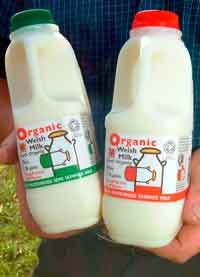Organic milk healthier, says new report

Organic milk is healthier than its conventional counterpart, according to a report from scientists at Newcastle University. The work examined 22 brands of milk – 10 of which were organic – and found that the organic milk contained lower levels of saturated fats and more beneficial fatty acids than conventional milk.
Lead researcher Gillian Butler of the university’s Nafferton Ecological Farming Group said the quality of the organic milk was better all year round. Previous research had suggested the benefits were minimal for winter milk.
The new study, published in this month’s Journal of Dairy Science, also showed that the nutritional content of conventional milk varied more. “The results suggest greater uniformity of feeding practice on farms supplying organic milk, since there were no brands which differed consistently in fat composition,” said Mrs Butler.
“We were surprised to see obvious differences between the conventional brands, with the more expensive ones not necessarily better.” She linked this to a lower reliance on grazing and suppression of clover by agrochemicals.
Four years ago the Food Standards Agency said while organic milk could contain higher levels of short-chain omega-3 fatty acids, these were of limited heath benefit. In addition, an FSA-funded review in 2009 showed that organic food was no healthier than conventional produce.
However, the Soil Association said that six studies had now shown that organic milk had more fat-soluble nutrients and healthier fatty acids.
It welcomed the latest report, saying it identified the importance of feeding at least 60% grass or conserved grass to organic cows, as required by organic standards.
Emma Hockridge, Soil Association head of policy, added: “This ground-breaking research proves for the first time that people buying organic milk will benefit from the higher levels of beneficial fatty acids in organic milk throughout the whole year.
“It shows the clear link between healthy soil, healthy animals and healthy people, and is another warning flag against the proposed 3770-cow mega dairy at Nocton in Lincolnshire.”
